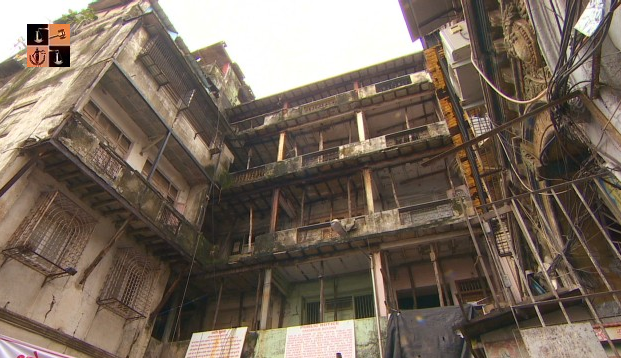The Maharashtra government came up with a law for acquiring old and dilapidated buildings that were unsafe as the tenants were sitting tight over the properties and landlords had no money for repairs, the Supreme Court observed on Tuesday while examining whether privately owned resources can be considered "material resources of the community".
Chief Justice D Y Chandrachud made the observations while dealing with a host of petitions filed by landlords who are up against the Maharashtra law.
He is heading a nine-judge constitution bench which is considering the vexed question arising from the petitions about whether private properties can be considered "material resources of the community" under Article 39 (b) of the Constitution, which a is part of the Directive Principles of State Policy (DPSP).
Article 39(b) makes it obligatory for the State to create policy towards securing “that the ownership and control of the material resources of the community are so distributed as best to subserve the common good”.
Mumbai is a densely populated city with old, dilapidated buildings that house tenants despite having become unsafe due to lack of repairs. In order to repair and restore these buildings, the Maharashtra Housing and Area Development Authority (MHADA) Act, 1976 imposes a cess on its occupants which is paid to the Mumbai Building Repair and Reconstruction Board (MBRRB) that oversees repair and reconstruction of these "cessed buildings".
Invoking the obligation under Article 39(b), the MHADA Act was amended in 1986. Section 1A was inserted into the Act to execute plans for acquiring lands and buildings in order to transfer them to those needy and in possession of such lands or buildings.
The amended law has Chapter VIII-A with provisions allowing the state government to acquire cessed buildings and the land they are built on if 70 per cent of the occupants make such a request.
The Property Owners Association has challenged Chapter VIII-A claiming that the provisions discriminate against the owners and violate their right to equality under Article 14.
As many as 16 petitions including the lead petition filed by the Mumbai-based Property Owners Association (POW) was heard by the bench which also comprised Justices Hrishikesh Roy, BV Nagarathna, Sudhanshu Dhulia, JB Pardiwala, Manoj Misra, Rajesh Bindal, Satish Chandra Sharma and Augustine George Masih.
The lead plea was filed by POW way back in 1992 and it was referred thrice to larger benches of five and seven judges before being referred to a nine-judge bench on February 20, 2002.
The CJI referred to the distinction between a case of a private person as opposed to title in the community. He gave the example of private mines and said, "They may be private mines. But in a broader sense, these are material resources of the community. The title may rest in a private individual but for the purpose of Article 39 (b), our readings should not be constricted but must have that broad understanding." "Take a case like these buildings in Mumbai. Technically, you are right that these are privately owned buildings, but what was the reason for the law (MHADA Act)... we are not commenting on the legality or the validity of the law that will be tested independently," the CJI said.
"The reason why the state legislature came out with this (Act) was that these are old buildings of the 1940s...With a kind of monsoon in Mumbai, these buildings get dilapidated because of the saline weather," Justice Chandrachud said.
He referred to the meagre rent being paid by tenants, especially in Mumbai, living in these old buildings.
"Because, honestly, the fact that the rent was so meagre that the landlord said no, they had no money at all actually to repair them...and (with) the tenants sitting tight, no one would have the wherewithal to repair the whole building and hence the legislature came up (with the Act)," the CJI said.
Elaborating on the phrase 'material resources of the community', the bench said the community has a vital interest, and if a building falls, the community is directly affected.
There are around 13,000 cessed buildings in Mumbai which need restoration or reconstruction.
However, their redevelopment is often delayed due to differences between tenants or between owners and tenants on appointing a developer.
At the outset, Solicitor General Tushar Mehta, appearing for the Maharashtra government, told the bench that "the only issue that has been referred to a larger Bench of 9-judges is whether the expression 'material resources of the community' under Article 39 (b) covers privately owned resources or not." The top law officer also said, "It is clear that the un-amended Article 31-C, to the extent upheld by the judgment in the Kesavananda Bharati case, is valid and in operation".
The historically acclaimed 1973 Kesavananda Bharati judgement on "basic structure" doctrine had clipped the vast power of Parliament to amend the Constitution and simultaneously gave the judiciary the authority to review any amendment.
At the same time, the 1973 verdict also upheld the constitutionality of a provision of Article 31-C, which implied that amendments for implementing the DPSP, if they do not affect the 'basic structure' of the Constitution, shall not be subjected to judicial review.
The hearing remained inconclusive and would resume on Wednesday.
(Only the headline and picture of this report may have been reworked by the LatestLaws staff; the rest of the content is auto-generated from a syndicated feed.)
Source Link
Picture Source :


























